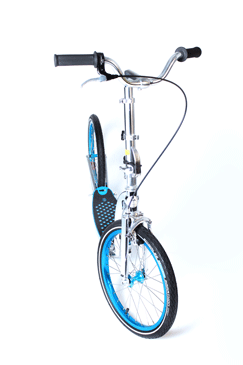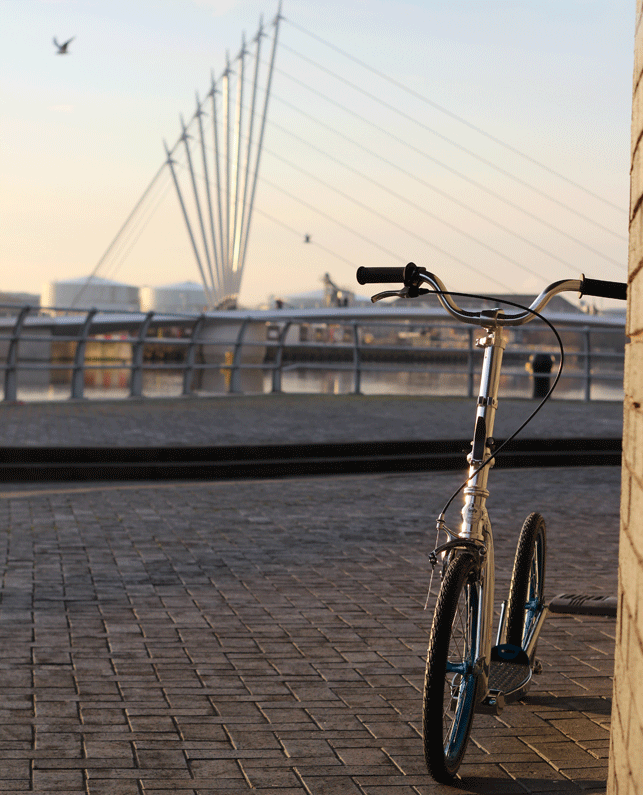
‘‘We like to think that we’ve designed the entire thing – not just the product, which is the easier bit – but the business structure with this ‘ultra lean’ concept,’’ Jason iftakhar, SwiftyScooters’ co-founder
Salford has a reputation: an expanse of industrial north-west England, built around the unkempt canals of Britain’s nineteenth-century industrial revolution, littered with an overspill of Manchester’s graffiti and gangs.
Yet most recently it has become one of the country’s greatest hopes: the new home of the BBC, museums, galleries, a university, sports stadium, and with a sparkle of design and ingenuity within its business model, a company that could give hope to the nation’s manufacturing industry.
Swifty Scooters is a family run business that designs and builds incredibly fun, adult-sized, collapsible scooters from its home beside Salford’s canal.
The product is the ideal vehicle for quickly zipping through a busy urban setting, able to fizz through pedestrian crowds and nip through traffic under the power of its rider.
Its design is easy on the eye, solid underfoot and so incredibly nimble that it takes you by surprise. It comes in a range of colourways and finishes that make it a great, eco-friendly, modern-day method of getting around.
The product’s origins should provide inspiration to all designers, as its success comes as part of a long term plan from its creators Jason and Camilla Iftakhar, who met at the Royal College of Art. Graduating seven years ago as product and apparel designers, respectively, they set up their own design consultancy Jamily as a platform to build something of their own.
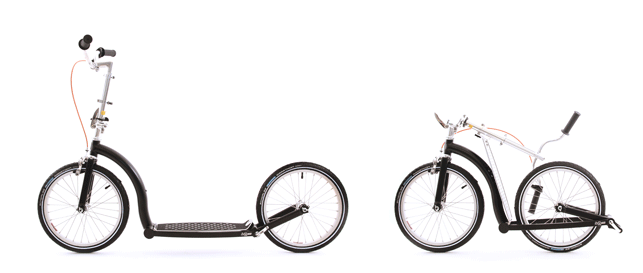
The unique and innovative folding mechanism allows
you to fold it in three easy stages
How it all began
The idea of a scooter came from one of Jason’s university projects that over time matured into the design for the Swifty.
“The basic principal is that all the little aluminium ones that you get are crap to ride for adults, basically: they’re horrible,” explains Jason, breaking into a well-worn theme. “And you look absolutely stupid – you’re an adult on a kids toy!
“We have the workshop here where we make things for other clients, and had been tinkering with various concepts for quite some time and how it would fold, and in 2010 we decided to do it properly and seriously, and had the finance in place to go. The timing was right and the branding was right, and that’s how it all started,” adds Jason.
The proceeds from the consultancy work were used to start their own sports-lifestyle brand, and its own product designed and manufactured in the UK.
“We wanted to choose a product that we saw had longevity, not only in the product as it’s own lifecycle, but as the brand also, and that’s what Swifty has – it’s almost a timeless classic already.
“Even though it’s only six months old, it has that appeal and that look about it, which was something that we were adamant we would create in the object.
“We see it as an object that will sell for the next 10 to 15 years and become a classic like a Brompton or a Moulton.”
Designed through vast amounts of sketching, some modelling in Solidworks and rendering in Keyshot, the product really took shape through physical prototypes.
“We made probably about three different versions: to work out how it would fold, what bits would fold, how many folding stages there would be.
“You can sketch on paper as much as you like, but you’ll only really get to have a relationship with that object when you make it in reality and play with it, that’s really important.
“You can make a solid model, you can animate it, articulate it, you can have it all linked so it moves and slots into place and has all the tolerances right, but you can’t touch it still or see how it behaves in the rain, where it’s going to get dirty.”
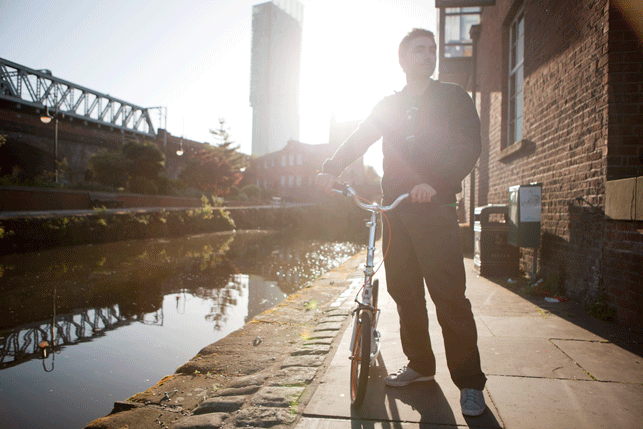
Co-founder Jason Iftakhar with the Swifty in its homeland of Salford
Made in the UK
This led to the use of UK manufacturing, and the full business structure that has contributed to Swifty’s almost overnight success.
“We like to think that we’ve designed the entire thing – not just the product, which is the easier bit – but the business structure with this ‘ultra lean’ concept.
“The scooter is designed so there is minimal tooling involved in setting up the manufacturing process. We’ve used ‘off the shelf’ standard sized tubing that you can get from any steel merchant, and we’ve used manufacturing techniques and process that require very little tooling.
“So we’ve been able to invest in 100 – 300 scooters with a relatively low outlay, which means we can sell every scooter, and every scooter we make we can make a couple more out of the proceeds – so we can double and double and double our stock in a short amount of time based on orders.
“I suppose design therefore shows if you’re clever with how you manufacture something and how you design it in the first place you can actually design a business structure to self fill itself.
“For Taiwan we’d have to meet their minimum orders and we’d have to bring in a whole container of scooters and take the gamble of whether they’d sell. Whereas in this case we get the benefit of it being made in the UK, which we really wanted to do, and the benefit of doing it in a lower volume to test the market.
“If anything were to go wrong there wouldn’t be loads of stock we’d have to tweak, we could sort it out as we go along.
Worth the price tag
Fortunately there’ve been no problems or recalls with any of the parts built locally, with the scooter tested to official British and European standards, plus some very rigorous ‘manual’ testing that took place along the quayside in Salford.
“People are supporting British-made stuff,” says Swifty’s proud designer. “We’re not a cheap scooter, we’re £499, it’s expensive – realistically its half a thousand pounds and you can buy a second-hand, old banger car for that – but people are willing to invest in it because it’s a British-made product and because it supports the local industry.
“People understand that now.”
The result is that Swifty has recently signed up to produce special editions of its scooters for several big name companies, the first with lifestyle retailer The Conran Shop.
“The magic that we’ve had with it is that no matter who you show it to, they kind of get it straight away, and that crosses cultural boundaries. As a designer I think that’s something you always want to achieve, and it’s very difficult to do.
“What we’ve found is: we don’t have to sell it. You just say ‘have a go’ and everyone comes back with this big smile.”
With more designers setting up home- grown methods of producing great designs Britain could be on the verge of a manufacturing resurrection. It’d be fitting if Salford’s resurgence were at the heart of it.
swiftyscooters.com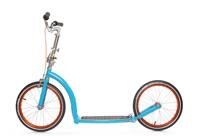
Swifty Scooters are carving a nimble path for British design and manufacture
Default


